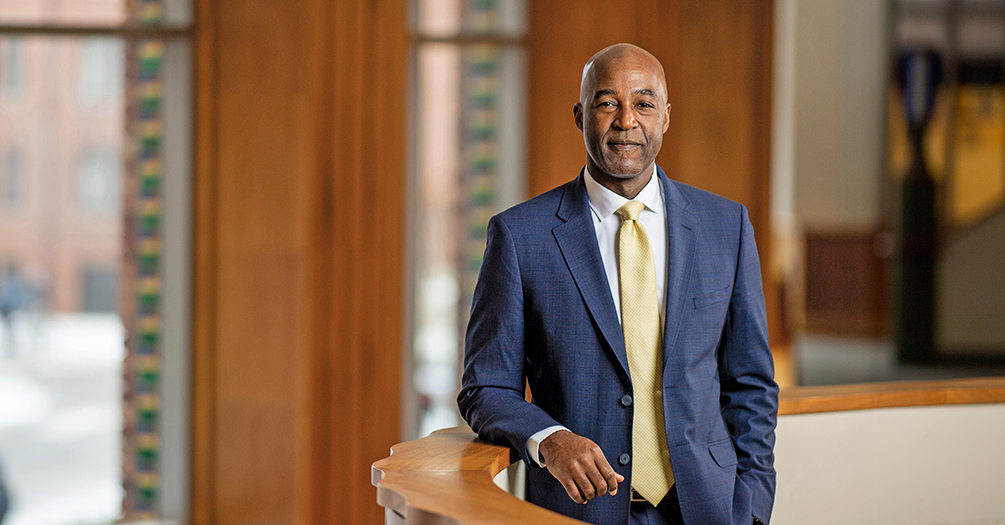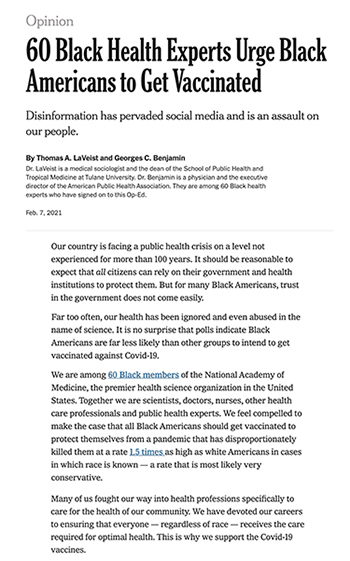From the Dean: Let’s Talk Science

Dean F. DuBois Bowman
School of Public Health
The COVID-19 pandemic has been part of the daily news for over a year now. And you may have noticed varying coverage at times. One headline offers good news, highlighting the strong performance of one of the vaccines. The next day, headlines might share a different story, maybe new data on a coronavirus variant that raises concerns about the future efficacy of the vaccine that showed such promise in yesterday’s news.
Day by day, since those very first news stories about this novel virus, we have watched science change. Many of us at Michigan Public Health have been actively engaged in leading the change—developing scientific studies, tracking new findings, and forming new insights about the virus and the new realities we’ve shaped around it.
We have seen how long it can take to reach consensus about a single aspect of this infectious disease. How exactly does it spread? How long does it take to develop symptoms? Can it transmit asymptomatically? How is scientific communication—from news coverage to published studies to our own thoughts and feelings about the pandemic—keeping up with the science itself?
For those aware of the dynamic nature of science, the shift in our scientific understanding is par for the course. But this fluidity provides an access point for criticism of scientific endeavors for those who look to science for bedrock “truths” or for those who see certain scientific findings as socially or politically motivated.
Science Is Patience and Uncertainty
Science takes time. We meticulously design and conduct tens of thousands of studies and work to draw insights from the results. This process reflects the arc toward scientific understanding. But along this pathway, science changes—because we change. Human culture develops, the world around us evolves, and our interpretations shift to try to keep up.
Science cannot predict the future, and perhaps our uncertain future is what entices so many of us to pursue scientific work professionally.
—Dean F. DuBois Bowman
As we traverse this path, we are often called upon to share the latest results and explain what those results mean. In sharing what we know, we must always exercise great humility and acknowledge the limits of our understanding. Science cannot fully predict the future, and perhaps our uncertain future is what entices so many of us to pursue scientific work professionally.
Science Is Speaking and Listening
As a biostatistician, I deal with plenty of data. Data potentially reveal wonderful insights into the world around us. But how do we get those data? And how do they inform the decisions we make as a community? Scientists strive for objectivity. Safeguards in our research processes help us collect, analyze, and interpret data. But no scientific study is without limitations and potential biases.
Science provides much more than basic “factual” information. The translation of scientific evidence shapes behavioral norms, informs policymaking, and even suggests moral guidelines within communities. In the news, we see epidemiologists argue over the definition of herd immunity and when we might achieve it. Researchers debate when to recommend clinical screenings. As science shifts, social attitudes and policies shift. But the opposite is also true. The attitudes we exhibit and policies we develop affect how we do science. As individuals and as societies, we choose the kind of science we do and who is affected by it.
So let’s choose science that pursues a healthier, more equitable world for all. Let’s help others understand that change is part of the scientific process. And let’s lead the change where change is needed.
As the pandemic evolves, the Michigan Public Health community will continue its work at the forefront of advancing the scientific landscape. We will recover from the pandemic, but we must work to ensure that all recover equally. With a renewed commitment to compassion, equity, and humility, we can continue improving science that benefits everybody.
—Dean F. DuBois Bowman
School of Public Health
Addressing Racism
 In February, I was one of sixty Black members of the National Academy of Medicine who signed an opinion article in The New York Times urging Black Americans to receive a COVID-19 vaccine. Vaccine hesitancy and refusal remain high among Black Americans, despite numerous
studies demonstrating that the pandemic has disproportionately impacted Black Americans.
In February, I was one of sixty Black members of the National Academy of Medicine who signed an opinion article in The New York Times urging Black Americans to receive a COVID-19 vaccine. Vaccine hesitancy and refusal remain high among Black Americans, despite numerous
studies demonstrating that the pandemic has disproportionately impacted Black Americans.
We have a history in our country of health institutions mistreating communities of color, and we all should know about projects like the Tuskegee experiment that grossly harmed Black Americans. Instances like these and other aspects of systemic racism have led to understandable lasting mistrust of health institutions among some members of communities of color. Public health leaders must work actively to understand these concerns, address them, and rebuild trust with these communities to avoid hesitancy when it comes to the COVID-19 vaccines.
Racism is a public health crisis, and it is part of our duty in public health to take action to help combat this crisis in its many forms. I was humbled to be part of the group of contributors who signed the Times article. But that was just one way the School of Public Health community has been addressing racism. This is ongoing, essential work, and we continue to use our expertise and research to help the public understand how racism impacts health outcomes and how we can improve the well-being of people of color.
We are steadfast in our commitment to anti-racist work, and you will continue to hear about our approaches to this work in society more broadly as well as within our own school community—from teaching and research to communicating, hiring, and building prospective student pipeline programs. Bringing the best scientific minds to the field of public health will continue to be a vital step toward a brighter future for all of us.
—Dean F. DuBois Bowman
- Learn more about anti-racism work at Michigan Public Health.
- Interested in public health? Learn more today.
- Read Good Science Changes: That’s a Good Thing in this issue of Findings.
- Support research and engaged learning at Michigan Public Health.
